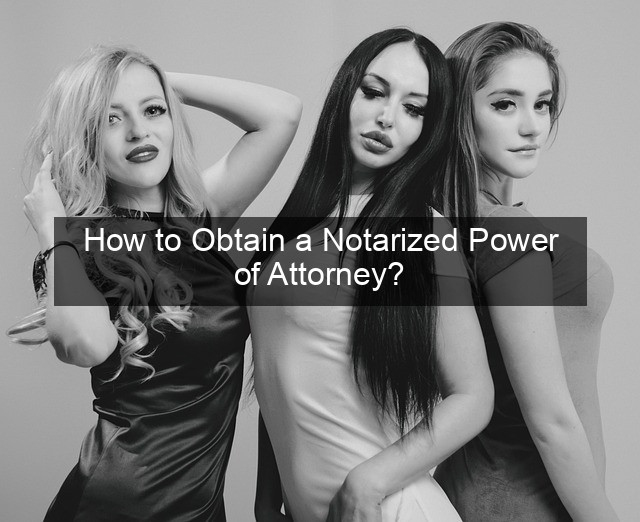How to Obtain a Notarized Power of Attorney?
- How to Obtain a Notarized Power of Attorney?
- How to Obtain a Notarized Power of Attorney
- Understanding the Power of Attorney
- Types of Power of Attorney
- Choosing Your Agent
- Drafting the Document
- The Notarization Process
- Finding a Notary Public
- Required Documentation
- Completing the Notarization
- After Notarization
- Storing Your Document
- Conclusion
- Frequently Asked Questions (FAQ)
- Common Questions about Power of Attorney

How to Obtain a Notarized Power of Attorney
Navigating legal matters can feel overwhelming, especially when it involves granting someone else the authority to act on your behalf. A power of attorney is a crucial legal document that empowers a designated individual, known as your agent or attorney-in-fact, to manage your affairs. This can range from financial transactions and healthcare decisions to property management and legal proceedings. However, a power of attorney isn’t legally binding until it’s properly notarized. This process validates the document’s authenticity and ensures its acceptance by institutions and individuals. This comprehensive guide will walk you through the necessary steps to obtain a notarized power of attorney, offering clear and concise instructions to simplify this sometimes complex procedure.
Understanding the Power of Attorney
Types of Power of Attorney
Power of attorney documents come in various forms, tailored to specific needs. A durable power of attorney remains effective even if you become incapacitated, ensuring continued management of your affairs. A limited power of attorney grants authority for a specific purpose and duration, such as selling a property. A medical power of attorney, often referred to as a healthcare proxy, allows someone to make medical decisions on your behalf if you are unable to do so yourself. Choosing the right type is essential for addressing your individual circumstances.
Understanding the nuances of each type is vital for selecting the appropriate document that aligns with your requirements. A durable power of attorney offers continuous coverage, even during periods of incapacity, whereas a limited power of attorney provides focused authority for a particular task. A medical power of attorney addresses healthcare decisions specifically.
Consulting with a legal professional can provide invaluable guidance in determining the most suitable power of attorney for your specific situation. They can help you understand the implications of each type and ensure the document accurately reflects your wishes.
Choosing Your Agent
Selecting an agent, also known as your attorney-in-fact, is a critical decision. This individual will have significant authority over your affairs. Choose someone you trust implicitly, who is responsible, and capable of managing the assigned tasks. Consider their organizational skills, financial acumen, and commitment to acting in your best interests.
Open communication with your chosen agent is paramount. Discuss your expectations and ensure they understand the responsibilities involved. This dialogue helps build a strong foundation of trust and ensures they are prepared to handle the assigned duties.
Regularly reviewing your power of attorney arrangement is important, especially if your circumstances change or if you have concerns about your agent’s performance. This ongoing assessment helps safeguard your interests and ensures the arrangement remains aligned with your needs.
Drafting the Document
While you can draft a power of attorney yourself, it’s highly recommended to seek legal counsel. An attorney can ensure the document adheres to state-specific requirements and accurately reflects your wishes. They can also address potential legal complexities and minimize the risk of future disputes.
Using a template can be a helpful starting point, but it’s crucial to customize it to your specific needs and state regulations. Generic templates may not adequately address your individual circumstances, and using an outdated or incorrect template could invalidate the document.
Accuracy and clarity are paramount in the drafting process. Ensure the document clearly defines the powers granted, the duration of the agreement, and any specific limitations or instructions. Ambiguous language can lead to misinterpretations and legal challenges.
The Notarization Process
Finding a Notary Public
Notaries public can be found in various locations, such as banks, post offices, law offices, and even some retail stores. Online directories and your state’s notary commission website can help you locate a notary near you. Ensure the notary is authorized to perform notarizations in your state.
Verifying the notary’s credentials is essential to ensure the notarization is legally valid. Check their commission expiration date and confirm they are in good standing with their state’s regulatory body.
Scheduling an appointment in advance is often recommended, especially during peak times. This ensures the notary is available and avoids unnecessary delays in the notarization process.
Required Documentation
Bring your completed, unsigned power of attorney document to your notary appointment. Both you and your chosen agent must be present and provide valid government-issued photo identification. Acceptable forms of ID typically include driver’s licenses, passports, or state-issued identification cards.
Avoid signing the document before your appointment. The notary must witness your signature to ensure its authenticity. Pre-signing the document could invalidate the notarization.
Review the document carefully before signing to ensure its accuracy and completeness. Once signed and notarized, the document becomes legally binding.
Completing the Notarization
The notary will verify your identities, witness your signatures, and affix their official seal and signature to the document. They will also complete a notarial certificate, which records the details of the notarization, including the date, location, and identities of the parties involved.
The notary may ask you to affirm under oath that the information in the document is true and that you are signing it willingly. This oath reinforces the legal validity of the document.
There is typically a fee for notary services, which varies depending on the state and the specific notary. Inquire about the fee beforehand to avoid any surprises.
After Notarization
Storing Your Document
Keep the original notarized power of attorney document in a safe and accessible location. Inform your agent of its whereabouts and provide them with a copy. Consider keeping a digital copy as well for easy access.
Organizing your important documents, including your power of attorney, can simplify matters for your agent and loved ones if they need to access it in the future. A well-organized system ensures vital documents are readily available when needed.
Periodically review your power of attorney document and update it as needed. Life changes, such as marriage, divorce, or the death of your agent, may necessitate revisions to the document.
Conclusion
Obtaining a notarized power of attorney is a crucial step in ensuring your affairs are managed according to your wishes. By understanding the different types of power of attorney, selecting a trustworthy agent, and following the proper notarization procedures, you can empower someone to act on your behalf with confidence. While the process may seem daunting, this guide provides a clear roadmap to navigate the necessary steps. Remember, consulting with a legal professional can offer invaluable guidance tailored to your individual circumstances. Taking these proactive steps can provide peace of mind knowing your affairs are in capable hands.
Frequently Asked Questions (FAQ)
Common Questions about Power of Attorney
- What is the difference between a general and a limited power of attorney?
- Can I revoke a power of attorney?
- What happens if my agent misuses their authority?
- Do I need a lawyer to create a power of attorney?
- How much does it cost to notarize a power of attorney?
| Question | Answer |
|---|---|
| What is the difference between a general and a limited power of attorney? | A general power of attorney grants broad authority, while a limited power of attorney specifies the exact powers granted. |
| Can I revoke a power of attorney? | Yes, you can revoke a power of attorney in writing. |
| What happens if my agent misuses their authority? | You can take legal action against your agent for misuse of authority. |
| Do I need a lawyer to create a power of attorney? | While not legally required, it’s highly recommended to consult with a lawyer. |
| How much does it cost to notarize a power of attorney? | Notary fees vary by state and notary. |
External Resources:


